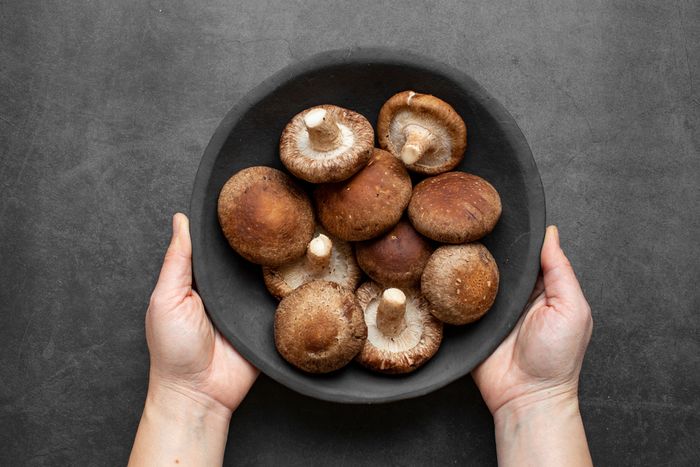Shiitake Mushrooms: Risk Factors and 3 Possible Side Effects
Updated September 21, 2023.

Two of the most commonly eaten mushrooms in classic cuisine are white button mushrooms and Shiitake mushrooms. As such, many people don't realise the potential functional benefits or the risk of side effects that they present. What, if any, are the potential side effects of fresh, wild Shiitake mushrooms and Shiitake mushroom extracts?
Potential Side Effects From Shiitake Mushrooms
1. Shiitake Mushrooms May Cause Digestive Problems
If you are a perfectly healthy individual, then the chance of experiencing digestive stress from eating Shiitake mushrooms is relatively low unless you consume them in excessive amounts. Like most other food substances, consuming too many Shiitake mushrooms in a single sitting can make it difficult for your body to handle, potentially causing the following symptoms:
- Stomach cramps
- Bloating
- Nausea and vomiting
- Diarrhoea
2. Shiitake Mushrooms May Affect Blood Components
Our bodies possess a type of disease-fighting white blood cell known as an eosinophil. Once our immune systems deal with the invading pathogens, eosinophils are supposed to disperse as they are no longer needed. However, in some circumstances, the concentration of eosinophils remains the same or elevated in a condition called eosinophilia. Prolonged eosinophilia can cause chronic inflammation that damages tissues.
Research has found that daily intake of Shiitake mushrooms can cause blood eosinophilia in some individuals.
If you experience any of the related symptoms of eosinophilia (rash, itching, diarrhea, and asthma), stop consumption of Shiitake mushrooms immediately and consult a doctor.
3. Shiitake Mushrooms May Cause Skin Rashes
Shiitake mushrooms are often revered for their benefits to skin health, but they can also cause skin-related problems in some instances. Although rare, a condition known as Shiitake flagellate dermatitis can manifest in otherwise healthy individuals, which means that it is not an allergic reaction to Shiitake mushrooms. Instead, it is believed to be a toxic reaction to a substance called lentinan. This side effect usually only occurs when the mushrooms are eaten uncooked as application of heat breaks down lentinan.
Symptoms of Shiitake dermatitis include:
- Formation of itchy erythematous (skin redness).
- Localised swelling.
- Fever.
- Malaise.
- Gastrointestinal problems.
Additionally, some individuals that suffer from mushroom or mould allergies might develop many of the same symptoms when consuming Shiitake mushrooms.
Are Shiitake Mushrooms Psychedelic?
Traditional functional mushrooms are often associated with illicit psilocybin mushrooms that cause hallucinations, but this is incorrect. All legal functional mushroom species are more closely related to harmless white button mushrooms than psychoactive drugs. So no, Shiitake mushrooms do not get you high.
Who Is at Risk for Shiitake Mushroom Side Effects?
Most of the potential side effects of Shiitake mushrooms occur only in certain people, which is especially true when they are cooked first or taken as refined Shiitake mushroom extracts and supplements. Regular individuals rarely experience side effects from these mushrooms, and so it is widely understood that certain people are more at risk than others.
As such, people that should exercise extreme caution when consuming Shiitake mushrooms are:
- People with existing mushroom or mould allergies.
- People with blood/bleeding disorders.
- People expecting surgery in the next few weeks.
There is also limited research on the safety of using Shiitake mushrooms while pregnant or breastfeeding, and so new or expecting mothers should refrain from consuming this fungus in order to stay on the safe side.
Functional Mushrooms and Autoimmune Diseases
Additionally, there is much debate surrounding the safety of using functional mushrooms with autoimmune disorders like rheumatoid arthritis, lupus, multiple sclerosis, and others. Autoimmune diseases occur when the immune system wrongly identifies healthy cells as dangerous and attacks them. Common treatments for autoimmune diseases involve suppressing the effectiveness of the immune system.
Since one of the benefits of Shiitake mushrooms is a boosted immune system, there might be a risk of aggravating the symptoms of autoimmune disorders. However, emerging research suggests that functional mushrooms may actually be immunomodulatory instead of immunostimulatory, which means that they may help balance out overactive immune systems as much as weakened immune systems. However, more research is needed, and caution should still be exercised.
Can You Eat Too Many Shiitake Mushrooms?
Even though Shiitake intolerance only exists in some of the population, you should always exercise caution when deciding on your dietary intake. As listed above, consuming too much of anything, including Shiitake fungus, can lead to health complications and unpleasant side effects.
Additionally, extra caution should be observed by those who are more at risk than others. If you are unsure, you should consult a doctor to better assess your personal risk when consuming Shiitake mushrooms.









